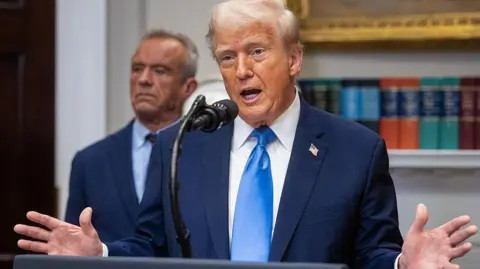Why Trump’s comments on vaccines and paracetamol risk child health
53 minutes agoFergus WalshMedical editor

 Getty Images
Getty ImagesThe public relies on measured, careful statements which are rooted in robust scientific research when deciding what medicines or vaccines they or their children should take.
When US president Donald Trump claimed on Monday in the Oval Office that taking Tylenol, known as paracetamol elsewhere, “is no good” and that pregnant women should “fight like hell” to only take it in cases of extreme fever, he delivered conjecture, personal opinion and gut feeling.
On paracetamol there is recent research – a review of studies – which suggests an association between paracetamol use in pregnancy and autism in children, but no causal link, meaning there is no strong evidence suggesting a risk.
Other researchers found no connection, but President Trump went much further in his comments, urging women not to take the medicine during pregnancy unless they couldn’t “tough it out”.
Health officials in the UK have stressed that paracetamol remains the safest painkiller available to pregnant women.
Aspirin or ibuprofen is not normally recommended because these drugs can affect the baby’s circulation.
UK Health Secretary Wes Streeting said: “I trust doctors over President Trump, frankly, on this.”
Mel Merritt, head of policy and campaigns at the National Autistic Society said: “This is dangerous, it’s anti-science and it’s irresponsible.
“President Donald Trump is peddling the worst myths of recent decades. Such dangerous pseudo-science is putting pregnant women and children at risk and devaluing autistic people.
“Let’s be clear – painkillers do not cause autism and vaccines do not cause autism.”
But it was on vaccines where the president made perhaps his most alarming comments without any recourse to science or statistics.
He said fragile babies were being pumped full of liquid like they were “horses” and that combination vaccines were harmful.
He singled out the MMR (measles, mumps and rubella) vaccine as one that should be given in single doses rather than a combined shot, and that he had heard a lot of bad things about it over the years.
This has echoes of the totally discredited claims of Andrew Wakefield – the British doctor who was struck off the UK’s medical register for his unethical research and his debunked claims that linked the MMR jab to autism.
President Trump’s comments on vaccines will be roundly rejected and condemned by UK policy makers, but they can’t be ignored. This is because they risk further undermining trust in immunisation – one of the great health success stories of the past century.
If parents refrain from getting their children vaccinated as a result of his unfounded claims, it risks the re-emergence of diseases like measles, whooping cough and polio which are already beginning to make a worrying comeback.
Combination vaccines are the mainstay of childhood immunisation. They spare children from dozens of repeat visits to be injected.
President Trump suggested vaccines should be given in single doses, but this means children would be left unprotected for long periods while waiting for the next dose.
Health policy deserves hard facts.
What we saw last night at the White House was comment and the potential for huge confusion.